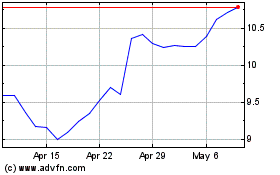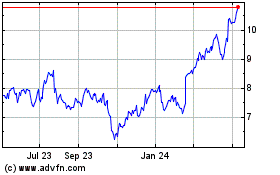Uber Raises $1.15 Billion From First Leveraged Loan
July 07 2016 - 9:10PM
Dow Jones News
Uber Technologies Inc. has raised $1.15 billion from a new
high-yield loan, according to a person familiar with the matter, as
the ride-hailing company stockpiles cash to ward off regulatory and
competitive threats around the world.
The new leveraged loan, Uber's first, brings the amount raised
in debt and equity to more than $15 billion and helps its existing
shareholder base avoid stock dilution.
Uber will pay a yield of about 5% on the leveraged loan, this
person said. The Wall Street Journal first reported last month that
Uber hired banks to issue debt of up to $2 billion with a yield of
4% to 4.5%.
The average yield of new leveraged loans ranges from 3.9% to
5.5%, according to data from S&P Global Market Intelligence
LCD. First-time issuers typically pay higher yields.
Uber's loan was arranged by four banks, with Morgan Stanley
leading and Barclays PLC, Citigroup Inc. and Goldman Sachs Group
Inc. participating, according to the person.
Uber is getting more creative in seeking out unorthodox sources
of capital to fuel its rapid global expansion. The debt deal comes
a month after the company closed a $3.5 investment from Saudi
Arabia's sovereign-wealth fund, part of the single-largest
injection into a venture-backed company of all time.
Uber's diverse investor sources include venture-capital firms
like Benchmark, mutual funds such as Fidelity Investments, and the
Saudi and Qatari governments. The startup last year worked with
Goldman Sachs Group Inc. to raise $1.6 billion in convertible debt
from the bank's wealthy clients.
By issuing debt rather than equity, Uber helps its shareholders
preserve their stakes in the company. Uber Chief Executive Travis
Kalanick has indicated the company is unlikely to go public for at
least another year.
Startup technology companies rarely tap the leveraged-loan
market because institutional investors usually reject borrowing
requests from companies like Uber that lose money. Unlike stock
pickers, who often buy on expectations of growth, debt investors
focus on a company's ability to generate the cash it needs to repay
obligations.
Home-rental site Airbnb Inc. last month closed $1 billion in
debt from large banks, a person familiar said at the time. The
company had last year projected a loss of about $150 million for
2015.
It is unclear how quickly Uber is burning through cash. The
company spends millions of dollars to attract riders and drivers,
especially in less-established markets. It offers cash bonuses to
new drivers and subsidizes the cost of lower-price rides. It has
said it is profitable in its most developed markets.
Uber also has been pouring funds into China, where it is engaged
in fierce competition with the country's largest ride-sharing
company, Didi Chuxing Technology Co. Didi last month said it raised
$4.5 billion in a fundraising round from investors, and added $2.8
billion in debt financing. The company was valued by investors at
about $28 billion.
Uber's $1.15 billion loan amounts to less than 2% of Uber's
equity value, last pegged by investors at $68 billion. If its
business started to falter, the company could raise cash by cutting
expenses in peripheral markets.
Leveraged loans are a private variant of junk bonds. Banks make
the loans to companies with below-investment-grade credit ratings
and unload them to professional investors such as mutual funds,
hedge funds and insurance companies. Issuers of the loans don't
need to publicly report financial information because the debt is
sold privately to investors who are thought to be more
sophisticated.
Maureen Farrell and Matt Wirz contributed to this article.
Write to Douglas MacMillan at douglas.macmillan@wsj.com
(END) Dow Jones Newswires
July 07, 2016 20:55 ET (00:55 GMT)
Copyright (c) 2016 Dow Jones & Company, Inc.
Barclays (NYSE:BCS)
Historical Stock Chart
From Mar 2024 to Apr 2024

Barclays (NYSE:BCS)
Historical Stock Chart
From Apr 2023 to Apr 2024
